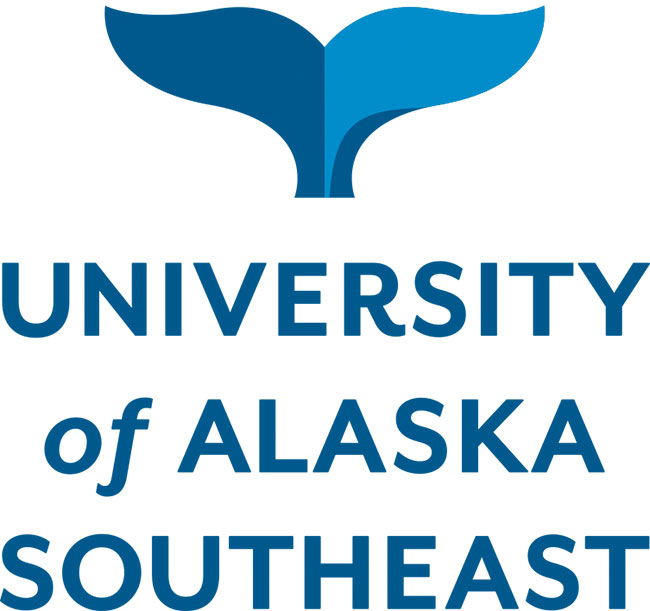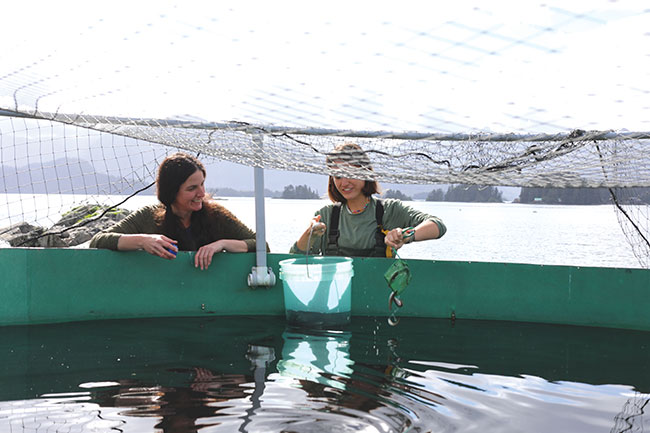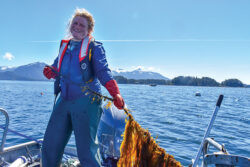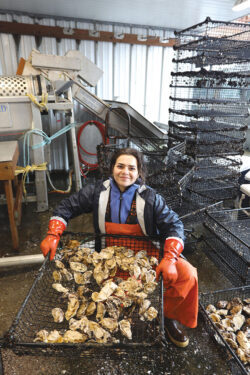
Education in sustainable ocean farming taking off in Sitka, Alaska
April 19, 2023
By University of Alaska
Brought to you by University of Alaska
 Professor Angela Bowers and student Suzanna O’Neill sampling salmon smolt to monitor growth and feed ratios at Sitka Sound Science Center.
Professor Angela Bowers and student Suzanna O’Neill sampling salmon smolt to monitor growth and feed ratios at Sitka Sound Science Center. The University of Alaska Southeast (UAS) – Sitka Campus is located on Baranof Island which resides on Lingít Aaní (Tlingit land) and has established a unique and one-of-a-kind training program in sustainable ocean farming, where hands-on learning is at the forefront of the curriculum.
In Alaska, the excitement surrounding mariculture opportunities has been growing given the state’s abundant natural resources, clean waters, maritime experience, and existing seafood infrastructure. This program is designed to mirror and grow alongside this burgeoning industry, and provide students experience in its established salmon enhancement program.

Sara Ebersole harvesting ribbon kelp (Alaria marginata) at the UAS research farm site in Sitka Sound.
In an immersive fall semester, students drive and maintain boats, create a small kelp farm next to rearing Pacific salmon, and work right alongside those in the salmon, shellfish and kelp industries. They become part of a unique and beautiful community in Southeast Alaska, making meaningful friendships and professional contacts that will last a lifetime.
Students from all over the country come to Sitka to learn about the salmon enhancement industry, seaweed propagation and out planting, and shellfish farming in the Alaska Aquaculture Semester. They take 13 credits of immersive and hands-on courses that teach salmon biology, hatchery techniques, rearing and spawning methods, seaweed reproduction, hatchery systems, culinary uses, and farming techniques.
Students are taught maritime skills by learning how to operate skiffs, maintain outboards, and survive in cold water environments. Additionally, students partner with local organizations to complete an internship in a relevant industry, which gives students the opportunity to put their skills into practice, network with professionals, and gain work experience.
“This opportunity allowed me to mingle and work side-by-side with industry professionals, who then offered me a job on the spot. It wasn’t until that moment that I realized I was of great value to this emerging industry by providing my acquired skills and knowledge gained from the Aquaculture Semester curriculum.” – Sara Ebersole (past student).
A big portion of the course curriculum is the production of a farm project where students are able to choose one or multiple species to research throughout the semester and design a farm taking all of the details into consideration, including permitting, energy and nutrient requirements as well as marketing and sales.

Garbielle Foursa sorting through oysters at Hump Island Oyster Farm in Ketchikan, AK
Students also propagate their own kelp from spores and eventually outplant juveniles on seeded lines. The kelp that students outplant is placed next to an area where Pacific salmon are reared in saltwater net pens, taking advantage of excess nutrients produced by the fish, an approach known as Integrated multi trophic aquaculture (IMTA) where species can benefit from each other. In this case the kelp is provided with extra nutrients from the fish and then in turn provides habitat refuge for the salmon after their release.
“We hope that involving our students in creative solutions that improve our aquaculture and fisheries industries in Alaska inspires them to think creatively in their future work.” – Professor Angela Bowers.
The state of Alaska has received $49 million through the EDA Build Back Better Regional Challenge grant for mariculture industry expansion. A portion of these funds were awarded to UAS to expand the mariculture program and the courses we offer. Through this expansion, UAS will be able to offer travel to other towns in Southeast Alaska to experience other salmon hatcheries, mariculture research facilities, shellfish farms, and kelp farms as well as improve facilities for learning and research opportunities.
“The Alaska Aquaculture Semester provided me with a much more specialized skill set than I was able to obtain at my home university and gave me a competitive edge in my field. Because my experience in Alaska gave me so much exposure working both in the lab and with industry partners I was able to start my first full time job out of this program with a much more comprehensive idea on what is necessary to bridge the gap between research and industry. This semester was extremely empowering and set me up for a successful beginning in a career in aquaculture.” – Gabrielle Foursa (past student)
Check out our website at aquaculturesemester.alaska.edu. If you are interested in taking this course or want to learn more about what we do, please contact: srebersole@alaska.edu.
UA is an AA/EO employer and educational institution and prohibits illegal discrimination against any individual: www.alaska.edu/nondiscrimination.
Advertisement
- Aquaculture economics pioneer Eugene Y.C. Shang dies
- Nova Scotia revamps aquaculture licensing, application process





